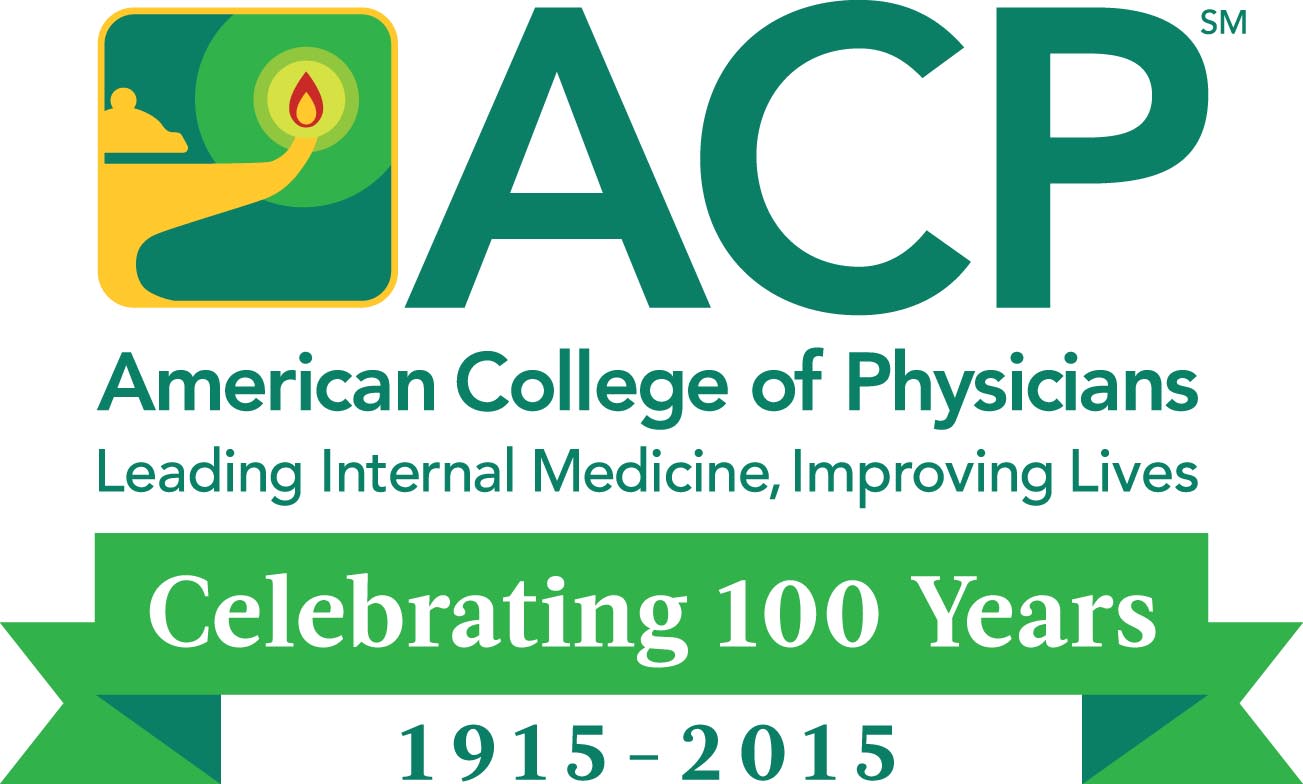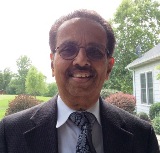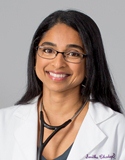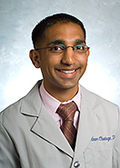 |
In honor of ACP's Centennial, My Kind of Medicine: IM Family is a new series of physician profiles featuring multi-generational internists. The stories will appear in several issues throughout 2015 to showcase how a tradition of caring and a passion for internal medicine are passed from one generation to the next. |

ACP Fellow: Rajagopal V. Chadaga, MD, FACP
Current Occupation: Academic Hospitalist, John Cochran Veterans Medical Center, St. Louis, MO
Residency: St. Elizabeth Medical Center, Youngstown, OH
Medical School: Kasturba Medical College, Mangalore, India

ACP Fellow: Smitha R. Chadaga, MD, FHM, FACP
Current Occupation: Academic Hospitalist, Legacy Emanuel Medical Center, Portland, OR
Chief Residency: Veterans Administration Hospital, and Presbyterian/St. Luke's Hospital, Denver, CO
Residency: University of Colorado, Aurora, CO
Medical School: University of Missouri-Kansas City School of Medicine, Kansas City, MO

ACP Fellow: Amar R. Chadaga, MD, FACP
Current Occupation: Associate Program Director, University of Illinois Chicago - Advocate Christ Internal Medicine Residency Program, Oak Lawn, IL
Chief Residency: McGaw Medical Center of Northwestern University (Evanston) Internal Medicine Residency Program, Chicago, IL
Residency: McGaw Medical Center of Northwestern University (Evanston) Internal Medicine Residency Program, Chicago, IL
Medical School: Southern Illinois University School of Medicine, Springfield, IL
In true sibling fashion, Smitha Chadaga, MD, FACP and Amar Chadaga, MD, FACP found their way to internal medicine by different paths, but they both say that their father, Rajagopal Chadaga, MD, FACP, has had a profound impact on their respective careers as internal medicine physicians. They also credit their success as physicians to their family-focused upbringing and their parents for allowing them every opportunity growing up.
Dr. Rajagopal Chadaga: The Patriarch
Dr. Rajagopal Chadaga made such an impact on his two children, Smitha and Amar, both internal medicine physicians, and he is still inspiring medical students today. One medical student recently wrote on an evaluation that he planned to pursue a career in internal medicine because of Dr. Chadaga's influence.
He remembers the moment he knew that he wanted to become a doctor. It was during an exhibition put on by the local medical school in his hometown of Mangalore, India. The exhibition took place when Dr. Chadaga was in the ninth grade, and he remembers that he was fascinated by the event and from that moment he knew that he wanted to become a physician. "I couldn't sleep for a couple of days after," he recalls.
As a child, Dr. Chadaga was mechanically-minded, interested in science, and curious about how things worked. He would often disassemble things but did not always put them back together, which annoyed his mother. "I was not successful at putting them back together, but I did try," he says, laughing.
Dr. Chadaga's eldest brother, Lakshminarayana, helped put him through medical school at Kasturba Medical School in Mangalore, India. He was Dr. Chadaga's biggest fan until his recent death. After completing medical school, Dr. Chadaga came to the United States, which he describes as a life-changing experience. Initially, he thought that he wanted to go into pediatrics or possibly pathology, but after completing an internship with rotations in surgery, and obstetrics and gynecology, he questioned whether he was cut out to be a clinical physician. Eventually, Dr. Chadaga settled on internal medicine because he felt that subspecialists are fragmented and focus only on their one part of the puzzle.
Today, he is an academic hospitalist at John Cochran Veterans Medical Center in St. Louis, MO. He recently went to a part-time schedule which allows him to work every other month, seeing patients with his team of residents and medical students both from Washington University and St. Louis University.
After morning rounds, Dr. Chadaga makes a point to go around to each of his patients later in the day on his own. "It's remarkable the way the patients open up to you, when earlier in the day they were hesitant with five or six people towering over them," he says.
Dr. Chadaga has always had a strong desire to ask questions and keep learning. If a patients' diagnosis is not resolved by the time they were discharged, Dr. Chadaga will write down their name and will look it up later to 'close the loop'. He says that he is always curious, and he tries to instill that sense of curiosity in his students.
As a mentor, Dr. Chadaga tries to make a difference in the way his team treats patients. One observation that he has made about medical students is that "they don't think outside the box." For example, he reminds them that "there are 101 things that can cause chest pain" and that each reason should be looked into thoroughly. Internists treat the whole person, not just their symptoms and look at every aspect of the situation, and as an internal medicine physician Dr. Chadaga has a sense of professional satisfaction because he is not only focusing on one aspect of the patient's care. A lot of physician burnout is due to doctors not enjoying medicine because they are busy calling attending physicians for consults, writing notes, and seeing patients. Sometimes doctors have no inclination to learn from their patients, he says. "There is no patient that is not interesting, and it is up to you to make them interesting. If you stop enjoying medicine, then you get burnt out."
Dr. Chadaga has been a member of ACP since he came to the U.S. 43 years ago, and was named a Fellow of ACP (FACP) in 1991. He depends on the College to continue to help him learn. He finds the "Updates in Internal Medicine" articles in Annals of Internal Medicine to be insightful, and says that ACP keeps him current with everything that is happening in medicine.
His favorite part of practicing medicine is the patient interaction. Dr. Chadaga has been in the VA hospital setting for his entire career. "It's a pleasure and a privilege to take care of the veterans. Whenever a veteran tries to thank me, I make it a point to tell them that they have truly earned it."
Dr. Smitha Chadaga: A Daughter Follows Her Father
Dr. Smitha Chadaga, the older of Dr. Rajagopal Chadaga's children, loved to read so much that her mother used to have to kick her out of her room and tell her to go outside and play. And while her parents encouraged her to forge her own path in life, and from age five, Dr. Chadaga knew she wanted to be a doctor.
Dr. Chadaga remembers her father talking about "doing rounds" when she was a little girl. She envisioned a giant auditorium where all of the patients would be in their hospital beds arranged in a big circle. She wondered if her dad jumped over the beds or climbed into the middle of the circle to examine the patients. When she went to work with her dad, she was disappointed that the patients stayed in their rooms during her dad's rounds, but she was thrilled when the nurses gave her a stethoscope of her own during one of her visits.
During her high school years, Dr. Chadaga volunteered at the Veterans Affairs (VA) Medical Center in Marion, IL, where her father worked. As a volunteer she moved patients via wheelchair to the clinic or to get x-rays, and brought documents elsewhere in the hospital. The volunteers she worked with were often veterans and both working with and for veterans was a special honor.
After high school, she entered a six-year program BA/MD program. When she joined medical school Dr. Chadaga imagined returning to her hometown to be a family physician. But during her third year of her schooling Dr. Chadaga took a questionnaire designed to help her choose a specialty and path that would best suit her. The questionnaire helped her realize that she wanted to be in an academic setting, and that she wanted to care for adults and impact them in a meaningful way. "I felt like internal medicine gave me the best chance at doing that," she said.
While Dr. Chadaga was determined to make her own path as a physician she drew inspiration from her father. "It was a huge inspiration to me as a kid, watching my dad makes an impact on people's lives," Dr. Chadaga said. "I still find inspiration in him, as an adult, and as a physician, I'm always asking for his advice about handling different things," she says, adding, "If I can do half of what he's done, I will be somewhat successful as a physician."
Today, Dr. Smitha Chadaga is an academic hospitalist in Portland, OR. She makes rounds with residents about 60% of the time and the other 40% of the time she does rounds by herself. Like her father, Dr. Chadaga enjoys the patient interaction that comes with the job. On average, she sees 12-15 patients each day. "I think the advantage to being a hospitalist is that I get to take care of these people through a set process and provide them with care, and impact their life in what, I hope, is a meaningful way," she says.
She views medicine on an individual level and in a global sense. Since there are a finite number of patients that she as an individual physician can help, she relies of educating medical students and residents to have a greater impact. Dr. Chadaga believes that educating medical students and residents, and impacting how they practice medicine, hopefully for the better, can have an exponential impact on patient care. Educating students and residents sustains her in a different way than patient contact.
In 1998, while in medical school, Dr. Chadaga became a member of ACP. She found and continues to find value in her ACP membership because it provides her with guidance on how to be a good learner and a good professional. When Dr. Chadaga was in medical school and completing her residency, there was a certain pathway set out for her, but she said that when she was done with schooling, there was no fixed pathway. ACP was a helpful guide for Dr. Chagada as she navigated her career by helping expand her knowledge and providing advice to her. She was named a Fellow of ACP (FACP) in 2013.
Medicine is an ever-evolving science, which Dr. Chadaga says proves to be a challenge for her, but working at an academic institution helps her provide her patients with evidence-based care. The residents help her stay current on the latest medical information. "While I'm teaching the residents, the residents are teaching me," she says. "They're in a position to learn in a different way."
Her advice for today's medical students who are choosing their residency is to not just imagine the best-case scenario for their desired career. She suggests that students "think about the most challenging situation in that specialty, and imagine yourself doing that every day. If you can say 'I'll be happy dealing with that challenging situation every day', then it's the right specialty for you."
Dr. Amar Chadaga: A Son Also Walks in His Father's Footsteps
Dr. Amar Chadaga is the younger of two children in the Chadaga family. Growing up, he remembers that his parents made a point for the family to eat dinner together each night. The conversations around the dinner table included world news and events that took place during the school day. He continues to enjoy talking and debating politics and current events with his parents, who he FaceTimes with every day.
When he was seven years old, his mother taped a notecard to his bedroom door. In her beautiful cursive writing, she wrote "The 3 D's to success are desire, dedication and determination." That notecard stayed on his bedroom door until he went to college, and although he does not know what happened to the notecard, Dr. Chadaga thinks about the 3 D's every day.
While his sister immediately knew that she wanted to study medicine in college, Dr. Chadaga was undecided when he entered his first year at the University of Illinois. His mother encouraged him to keep an open mind when he went to college. He and his mother developed a strong bond from very early in his life. Dr. Chadaga was born with a cleft lip and palate and was not able to speak or hear very well until age five. His mother would drive him around in the car and would point to a stop sign and say "that's an octagon." She continued to teach him even though he was slow to warm up to learning, and he calls her his biggest fan.
His mother suggested that he study engineering in college, and although he considered it, he knew that he wanted to interact more with people in his job. Dr. Chadaga was involved with student government and thought that he might want to become a lawyer but kept going back to his desire to find out what was wrong with people when they say "I'm not feeling well." Dr. Chadaga cannot pinpoint whether that mentality was ingrained in him by his father or his sister, but he says that his family has always been charity-oriented and had a desire to help people.
Like his sister, he also volunteered during his high school years at the hospital where his dad worked. Medicine became especially appealing to Dr. Chadaga because "at the end of the day, you can be social while helping people heal and learning constantly."
He studied medicine at Southern Illinois University School of Medicine. It was during his second year of residency that he fell in love with teaching. "You have to know the material so well to be able to teach it, and I finally started figuring out the material better," he said, noting that his year as an intern was tough for him.
During that same year in residency, he was a member of the winning Doctor's Dilemma team from the ACP Illinois Northern Chapter. The team participated in the competition at the Internal Medicine Meeting in San Diego, and while the squad exited early in national competition, he says that his first exposure to the ACP Internal Medicine Meeting was a pivotal moment in his career. He was named a Fellow of ACP (FACP) in 2013.
Today, he is an associate program director in the internal medicine residency at the University Of Illinois College of Medicine at Chicago Advocate Christ Medical Center Program. "I love my job," he says. Roughly 50% of the time Dr. Chadaga is administrative and didactic teaching while the rest of the time is spent interacting with patients on the inpatient teaching service. On non-clinical days, he moderates morning report, researches various topics in graduate medical education, mentors students and residents, and attends meetings related to the internal medicine residency. He likes that the days vary and that he his schedule is flexible.
Dr. Chadaga is also in charge of recruitment. Each year he conducts between 200 and 300 interviews to secure the upcoming intern classes. In 2013, after this first full year of teaching at Advocate Christ Medical Center, he was awarded the General Medicine Teacher of the Year Award. The internal medicine residents vote on who embodies the best internist in terms of evidence-based medicine, patient care, and teaching.
He tells his students to pay close attention to detail and strive to be the best. "You don't have to be the best," but Dr. Chadaga asks that they bring their "A" game every single day. Combining his love of teaching with patient care, Dr. Chadaga created a boot camp program for new interns to help learn essentials of inpatient medicine. It received positive feedback both before and after program took place.
Avoiding physician burnout is a challenge that Dr. Chadaga is working to overcome. Caring for inpatient patients can be busy and finding a work-life balance can be tricky. In order to combat physician burnout, Dr. Chadaga serves on a physician wellness committee at the hospital with colleagues from various departments. "Because there is always work to do and always ways to improve, you could stay at work all day, in any job," he says, adding that it is a little harder in medicine because the clock does not stop at 5 p.m.
Dr. Chadaga is also interested in researching bullying in hospital settings, in particular amongst residents and fellows. He says that bullying is the big elephant in the room that no one wants to talk about and that at times the hospital can be toxic and hierarchical.
Dr. Chadaga says that his father has had a profound effect on his career. He describes his dad as calm and cool under pressure. His father's approach to medicine is second nature, which he compares to Michael Jordan playing basketball. "If I could literally be half of the physician that he is, then I think I'd be an amazing physician." Dr. Chadaga adds that his father has a strong work ethic and that "his fire hasn't gone down at all. I definitely want to emulate him."

